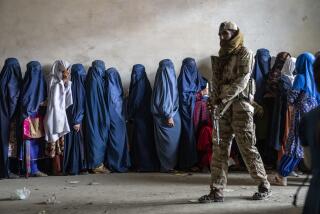HEALTH : Women’s Progress Called Key to Fighting Disease, Poverty
- Share via
WASHINGTON — While international health statistics present a steadily growing gap between industrialized nations and the Third World, an unexpected bright spot is emerging: otherwise impoverished areas in which women have found ways to better themselves economically and improve their environment.
Ayela Hammad, an Egyptian public health specialist who has worked extensively in developing nations, says economic progress for women appears to quickly translate into community health gains.
Hammad, one of the organizers of a recent international forum in Ghana on health as a condition for development, cites the case of Indonesian village women who borrowed money to build a small dam. They increased their income twenty-fold and quickly hired the first doctor to serve the area.
Later, she said, she witnessed the efforts of women in Zambia who organized to improve the health of their families and were able to conquer a cholera epidemic. She also cited women in Ghana who, through cooperative movements, have succeeded in gaining economic independence and improving health and education for their children.
“Health and literacy are essential to economic development,” she said. “If the predominating social values are eating and drinking, you don’t improve your life when your income improves. We’ve got to change values.”
Hammad believes that women instinctively have more concern for health and the environment. Without empowerment of women, for example, the population problem can’t be solved, she said.
“I don’t believe in birth control programs in themselves because they don’t work,” she asserted. “If women are totally dependent, their only function is to produce children.”
The same principle applies in the campaign to combat the spread of AIDS in developing nations, she said.
“If a man doesn’t want to use a condom, an independent woman can refuse sex, but a dependent woman can’t.”
The daughter of an Egyptian diplomat, Hammad earned a public health administration degree and a doctorate at Boston University, with postdoctoral studies at Harvard University, working with culturally deprived children in the United States. She has worked for the World Health Organization since 1968, much of that time in developing countries.
WHO studies show that the developing countries are getting the worst of two worlds, suffering from malnutrition, intestinal and respiratory diseases, AIDS and other endemic illnesses, and now are experiencing heart and circulatory problems, cancer, drug and alcohol abuse and occupational hazards associated with industrialization.
One of the aims of world health officials is to find new ways to combat the rising cost of health care, a problem for both rich and poor.
“People are going to have to help themselves more,” Hammad asserted. “As they have come to expect professional care, people don’t put cold compresses on a child’s forehead when it has a fever. They run for the doctor, and when he comes it may be too late.
“Personal hygiene and sanitation are important health factors, but they have to be taught, and that again means we have to have literacy.”
Third World Burden
The Third World bears a disproportionate burden of deaths from diseases that have much less effect on developed nations:
Third World Developed World Diarrhea 5 million Negligible Measles 1.5 million Negligible Malaria 1.5 million Negligible Pneumonia 5 million 400,000 Tuberculosis 4.5 million 40,000
Source: World Health Organization
More to Read
Sign up for Essential California
The most important California stories and recommendations in your inbox every morning.
You may occasionally receive promotional content from the Los Angeles Times.












